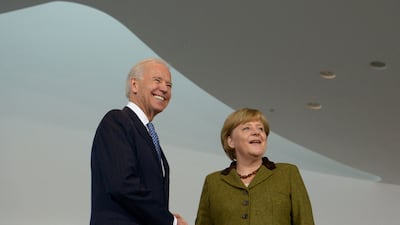Germany's Chancellor Angela Merkel will be the first European leader to meet US President Joe Biden in the White House on Thursday in what will be her last visit to Washington as chancellor before German elections in September.
Ms Merkel is no stranger to US politics. During her 15-year tenure at the helm of Germany's government, she worked closely with two out of three American presidents. George W Bush famously massaged her shoulders in 2006, while Barack Obama described her as a “reliable, honest and intellectually precise” counterpart.
It was under Donald Trump that the US-Germany relationship suffered, with differences arising on trade, Afghanistan, Iran, Nato and refugee policy. It was no surprise that Ms Merkel was one of the first world leaders to congratulate Mr Biden publicly after he won the election in November 2020.
“Our transatlantic friendship is indispensable if we are to deal with the major challenges of our time,” she said.
Experts see her visit to the White House on Thursday as a triumph for transatlantic ties, despite differences with the Biden administration over how to handle relations with China, the Nordstream pipeline and Afghanistan.
Optically, the visit is a declaration in itself that the Trump era is over — but Berlin has acute fears those times could return.
“The former president had gone out of his way to single out Merkel and Germany as more of an adversary than ally,” said Jackson Janes, a senior fellow at the German Marshall Fund.
“The visit will serve the symbolic purpose of ‘America is Back’ by highlighting that the US-Germany relationship is 'back', and the Trump approach, so slavishly executed by his ambassador to Berlin, Richard Grenell, is over,” he added.
A YouGov survey in Germany released last week found that 66 per cent of people believed relations had improved between Germany and the US, compared to only 19 per cent of Germans who viewed the US as a friendly ally under Mr Trump last year.
Only 11 percent of respondents believed that US has bad intentions towards Germany, compared to 27 percent in 2020.
But the Biden bounce-back has not translated into increased confidence in the US political system. A poll by the European Council on Foreign Relations released last week showed that 52 per cent of Germans believe that the American political system is broken.
“Many no longer see the US as an ally of the EU — and have doubts on whether it shares in their values and interests,” said Andreas Bock of the European Council on Foreign Relations.
While he emphasised Ms Merkel’s long-time experience in working with US presidents, he cautioned that “the biggest barriers on the path to a new relationship are likely the Nordstream 2 pipeline project and relations with China".

Mr Biden is under pressure from Congress to impose sanctions on Russia's Nordstream natural gas pipeline, which he waived in June. Before her visit, Ms Merkel, in an effort to assuage US concerns, offered guarantees that Ukraine would continue to be a gas transit even after the pipeline is completed.
“For Merkel, it’s key to find a way that reassures all sides to some extent and to find a good compromise. For instance, an arrangement that the pipeline should only be connected to the grid if Russia extends its existing transit contract with Ukraine (which runs until 2024) … From the German government's point of view, an extension until 2034 is possible,” said Mr Bock.
The Biden administration is also looking for a tougher stance from Germany on China, but that could also prove to be contentious as Ms Merkel has worked over the last 15 years to deepen the EU’s economic ties with Beijing.
Mr Bock said the Biden team “has understood that the US cannot prevent the pipeline from being completed, and therefore it could abstain from possible sanctions for the time being but probably demand a tougher stance from Germany towards China in return.”
Balancing these interests is even more challenging as Ms Merkel prepares to exit the leadership scene in September.
“She is respected for her handling of several major crises in Europe — the euro crisis, war in Ukraine, the refugee crisis, the pandemic — [and] her diplomatic skills, composure and experience with four US presidents will be hard to replace in the short term,” said Mr Bock.
The two leaders are also expected to discuss the withdrawal of coalition troops from Afghanistan, cyber security and Iran.


